| Listing 1 - 8 of 8 |
Sort by
|
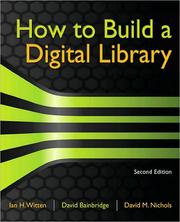
ISBN: 128232909X 9786612329098 0080890393 0123748577 9780080890395 9780123748577 Year: 2009 Publisher: Burlington, MA : Morgan Kaufmann Publishers,
Abstract | Keywords | Export | Availability | Bookmark
 Loading...
Loading...Choose an application
- Reference Manager
- EndNote
- RefWorks (Direct export to RefWorks)
How to Build a Digital Library is the only book that offers all the knowledge and tools needed to construct and maintain a digital library, regardless of the size or purpose. It is the perfectly self-contained resource for individuals, agencies, and institutions wishing to put this powerful tool to work in their burgeoning information treasuries.The Second Edition of reflect new developments in the field as well as in the Greenstone Digital Library open source software. The authors have based their revisions not only on their own research but also on user feedback over the years s
Digital libraries. --- Digital libraries - Collection development - Computer programs. --- Digital libraries -- Collection development -- Computer programs. --- Digital libraries -- Collection development -- Handbooks, manuals, etc. --- Greenstone digital library software. --- Digital libraries --- Library & Information Science --- Social Sciences --- Computer programs --- Collection development --- Computer programs. --- Digital curation --- Digital media collections --- Digital media libraries --- Digital repositories --- Electronic libraries --- Electronic publication collections --- Electronic publication libraries --- Electronic text collections --- Repositories, Digital --- Virtual libraries --- Greenstone (Computer file) --- Libraries --- Information storage and retrieval systems --- Web archives --- 025:681.3 --- 681.3*H3 --- 025:681.3 Bibliotheekautomatisering --- Bibliotheekautomatisering --- Collection development&delete& --- Information storage and retrieval
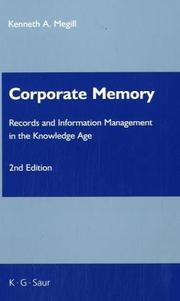
ISBN: 3598243715 9786612073663 3598440111 1282073664 9781282073661 9783598440113 Year: 2005 Publisher: München : K.G. Saur,
Abstract | Keywords | Export | Availability | Bookmark
 Loading...
Loading...Choose an application
- Reference Manager
- EndNote
- RefWorks (Direct export to RefWorks)
'Corporate memory' is the body of information that an organization needs to keep for re-use. It is the active and historical information that an organization has that is worth sharing, managing and preserving to enable it to function effectively. This book is aimed at records managers and archivists, who are responsible for maintaining and managing information within an organization. It describes fully the most up-to-date methods and approaches to this essential function. In addition, it also discusses the adoption of an international standard for record management.
002 --- 025.4 --- 681.3*H3 --- Informatieverzorging i. v. m. documentatie --- Ontsluitings- en terugzoektalen. Classificaties. Thesauri. Metadata voor information retrieval --- Information storage and retrieval. Cd-rom --- 681.3*H3 Information storage and retrieval. Cd-rom --- 025.4 Ontsluitings- en terugzoektalen. Classificaties. Thesauri. Metadata voor information retrieval --- 002 Informatieverzorging i. v. m. documentatie --- Corporations -- Information services -- Management. --- Documentation. --- Information resources management. --- Information retrieval. --- Knowledge management. --- Records -- Management. --- Management --- Business & Economics --- Management Theory --- Corporations --- Records --- Information services --- Management. --- Disposition of records --- Records management --- Data retrieval --- Data storage --- Discovery, Information --- Information discovery --- Information storage and retrieval --- Retrieval of information --- Management of knowledge assets --- Information resource management --- Information systems management --- IRM (Information resources management) --- Business corporations --- C corporations --- Corporations, Business --- Corporations, Public --- Limited companies --- Publicly held corporations --- Publicly traded corporations --- Public limited companies --- Stock corporations --- Subchapter C corporations --- Information resources management --- Information science --- Library science --- Documentation --- Information storage and retrieval systems --- Information technology --- Intellectual capital --- Organizational learning --- Management information systems --- Business enterprises --- Corporate power --- Disincorporation --- Stocks --- Trusts, Industrial --- Information Science --- Libraries --- Information and Documentation --- Employment --- Organizational memory --- Workflow
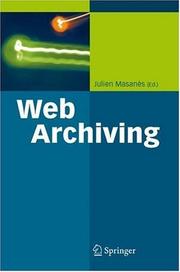
ISBN: 1281114197 9786611114190 3540463321 3540233385 3642062369 9783540233381 Year: 2006 Publisher: Berlin Springer
Abstract | Keywords | Export | Availability | Bookmark
 Loading...
Loading...Choose an application
- Reference Manager
- EndNote
- RefWorks (Direct export to RefWorks)
The public information available on the Web today is larger than information distributed on any other media. The raw nature of Web content, the unpredictable remote changes that can affect it, the wide variety of formats concerned, and the growth in data-driven websites make the preservation of this material a challenging task, requiring specific monitoring, collecting and preserving strategies, procedures and tools. Julien Masanès, Director of the European Archive, has assembled contributions from computer scientists and librarians that altogether encompass the complete range of tools, tasks and processes needed to successfully preserve the cultural heritage of the Web. His book serves as a standard introduction for everyone involved in keeping alive the immense amount of online information, and it covers issues related to building, using and preserving Web archives both from the computer scientist and librarian viewpoints. Practitioners will find in this book a state-of-the-art overview of methods, tools and standards they need for their activities. Researchers as well as advanced students in computer science will use it as an introduction to this new field with a hopefully stimulating review of open issues where future work is needed.
Web archives. --- Digital libraries. --- Electronic records --- Conservation and restoration. --- Computer science. --- Printing. --- Publishers and publishing. --- Library science. --- Management. --- Industrial management. --- Information storage and retrieval. --- Computers and civilization. --- Computer Science. --- Information Storage and Retrieval. --- Library Science. --- Innovation/Technology Management. --- Printing and Publishing. --- Computers and Society. --- Information Systems Applications (incl. Internet). --- Civilization and computers --- Civilization --- Business administration --- Business enterprises --- Business management --- Corporate management --- Corporations --- Industrial administration --- Management, Industrial --- Rationalization of industry --- Scientific management --- Management --- Business --- Industrial organization --- Administration --- Industrial relations --- Organization --- Librarianship --- Library economy --- Bibliography --- Documentation --- Information science --- Book publishing --- Books --- Book industries and trade --- Booksellers and bookselling --- Printing, Practical --- Typography --- Graphic arts --- Informatics --- Science --- Publishing --- Computer-based records --- Digital records --- Digitized records --- Documents in machine-readable form --- Machine-readable records --- Records --- Digital curation --- Digital media collections --- Digital media libraries --- Digital repositories --- Electronic libraries --- Electronic publication collections --- Electronic publication libraries --- Electronic text collections --- Repositories, Digital --- Virtual libraries --- Libraries --- Information storage and retrieval systems --- Web archives --- Internet archives --- Web site archives --- Web sites archives --- World Wide Web archives --- Archives --- Digital libraries --- Archivistics --- Computer architecture. Operating systems --- Information storage and retrieva. --- Information storage and retrieval systems. --- Automatic data storage --- Automatic information retrieval --- Automation in documentation --- Computer-based information systems --- Data processing systems --- Data storage and retrieval systems --- Discovery systems, Information --- Information discovery systems --- Information processing systems --- Information retrieval systems --- Machine data storage and retrieval --- Mechanized information storage and retrieval systems --- Computer systems --- Electronic information resources --- Data libraries --- Information organization --- Information retrieval --- Web archiving. --- 681.3*H3 --- 681.3*H3 Information storage and retrieval. Cd-rom --- Information storage and retrieval. Cd-rom --- Internet archiving --- Digital preservation --- Application software. --- Application computer programs --- Application computer software --- Applications software --- Apps (Computer software) --- Computer software --- Web archiving
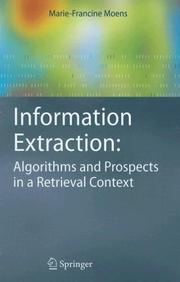
ISBN: 1402049870 1402049870 9781402049873 1402049935 9781402049934 1280634782 9786610634781 Year: 2006 Volume: 21 Publisher: Dordrecht : Springer,
Abstract | Keywords | Export | Availability | Bookmark
 Loading...
Loading...Choose an application
- Reference Manager
- EndNote
- RefWorks (Direct export to RefWorks)
Information extraction regards the processes of structuring and combining content that is explicitly stated or implied in one or multiple unstructured information sources. It involves a semantic classification and linking of certain pieces of information and is considered as a light form of content understanding by the machine. Currently, there is a considerable interest in integrating the results of information extraction in retrieval systems, because of the growing demand for search engines that return precise answers to flexible information queries. Advanced retrieval models satisfy that need and they rely on tools that automatically build a probabilistic model of the content of a (multi-media) document. The book focuses on content recognition in text. It elaborates on the past and current most successful algorithms and their application in a variety of domains (e.g., news filtering, mining of biomedical text, intelligence gathering, competitive intelligence, legal information searching, and processing of informal text). An important part discusses current statistical and machine learning algorithms for information detection and classification and integrates their results in probabilistic retrieval models. The book also reveals a number of ideas towards an advanced understanding and synthesis of textual content. The book is aimed at researchers and software developers interested in information extraction and retrieval, but the many illustrations and real world examples make it also suitable as a handbook for students.
Information storage and retrieval systems --- Academic collection --- 681.3*H3 --- Automatic data storage --- Automatic information retrieval --- Automation in documentation --- Computer-based information systems --- Data processing systems --- Data storage and retrieval systems --- Discovery systems, Information --- Information discovery systems --- Information processing systems --- Information retrieval systems --- Machine data storage and retrieval --- Mechanized information storage and retrieval systems --- Computer systems --- Electronic information resources --- Data libraries --- Digital libraries --- Information organization --- Information retrieval --- Information storage and retrieval --- Information storage and retrieval systems. --- Information organzation. --- Information organization. --- Organization of information --- Information science --- Library science. --- Information storage and retrieval. --- Artificial intelligence. --- Natural language processing (Computer science). --- Optical pattern recognition. --- Computer industry. --- Library Science. --- Information Storage and Retrieval. --- Artificial Intelligence. --- Natural Language Processing (NLP). --- Pattern Recognition. --- The Computer Industry. --- Electronic industries --- Optical data processing --- Pattern perception --- Perceptrons --- Visual discrimination --- NLP (Computer science) --- Artificial intelligence --- Electronic data processing --- Human-computer interaction --- Semantic computing --- AI (Artificial intelligence) --- Artificial thinking --- Electronic brains --- Intellectronics --- Intelligence, Artificial --- Intelligent machines --- Machine intelligence --- Thinking, Artificial --- Bionics --- Cognitive science --- Digital computer simulation --- Logic machines --- Machine theory --- Self-organizing systems --- Simulation methods --- Fifth generation computers --- Neural computers --- Librarianship --- Library economy --- Bibliography --- Documentation --- Pattern recognition. --- Design perception --- Pattern recognition --- Form perception --- Perception --- Figure-ground perception --- Data centers
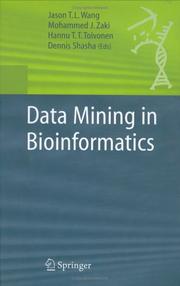
ISBN: 1280290927 9786610290925 1846280591 1852336714 1849968942 Year: 2005 Publisher: London Springer
Abstract | Keywords | Export | Availability | Bookmark
 Loading...
Loading...Choose an application
- Reference Manager
- EndNote
- RefWorks (Direct export to RefWorks)
8. 1. 1 Protein Subcellular Location The life sciences have entered the post-genome era where the focus of biologicalresearchhasshiftedfromgenomesequencestoproteinfunctionality. Withwhole-genomedraftsofmouseandhumaninhand,scientistsareputting more and more e?ort into obtaining information about the entire proteome in a given cell type. The properties of a protein include its amino acid sequences, its expression levels under various developmental stages and in di?erenttissues,its3Dstructureandactivesites,itsfunctionalandstructural binding partners, and its subcellular location. Protein subcellular location is important for understanding protein function inside the cell. For example, the observation that the product of a gene is localized in mitochondria will support the hypothesis that this protein or gene is involved in energy metabolism. Proteins localized in the cytoskeleton are probably involved in intracellular tra?cking and support. The context of protein functionality is well represented by protein subcellular location. Proteins have various subcellular location patterns [250]. One major category of proteins is synthesized on free ribosomes in the cytoplasm. Soluble proteins remain in the cytoplasm after their synthesis and function as small factories catalyzing cellular metabolites. Other proteins that have a target signal in their sequences are directed to their target organelle (such as mitochondria) via posttranslational transport through the organelle membrane. Nuclear proteins are transferred through pores on the nuclear envelope to the nucleus and mostly function as regulators. The second major category of proteins is synthesized on endoplasmic reticulum(ER)-associated ribosomes and passes through the reticuloendothelial system, consisting of the ER and the Golgi apparatus.
Bioinformatics. --- Data mining. --- Bio-informatics --- Biological informatics --- Biology --- Information science --- Computational biology --- Systems biology --- Data processing --- Algorithmic knowledge discovery --- Factual data analysis --- KDD (Information retrieval) --- Knowledge discovery in data --- Knowledge discovery in databases --- Mining, Data --- Database searching --- Information systems --- Bioinformatics --- Data mining --- 681.3*H3 --- 681.3*J3 --- 681.3*J3 Life and medical sciences (Computer applications) --- Life and medical sciences (Computer applications) --- Information storage and retrieval --- Database management. --- Computer science. --- Data structures (Computer scienc. --- Database Management. --- Programming Techniques. --- Information Systems Applications (incl. Internet). --- Data Structures. --- Data Storage Representation. --- Data structures (Computer science) --- Information structures (Computer science) --- Structures, Data (Computer science) --- Structures, Information (Computer science) --- Electronic data processing --- File organization (Computer science) --- Abstract data types (Computer science) --- Data base management --- Data services (Database management) --- Database management services --- DBMS (Computer science) --- Generalized data management systems --- Services, Database management --- Systems, Database management --- Systems, Generalized database management --- Informatics --- Science --- Computer programming. --- Application software. --- Data structures (Computer science). --- Application computer programs --- Application computer software --- Applications software --- Apps (Computer software) --- Computer software --- Computers --- Electronic computer programming --- Electronic digital computers --- Programming (Electronic computers) --- Coding theory --- Programming
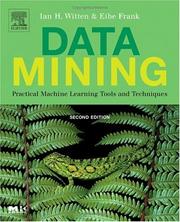
ISBN: 9780120884070 0120884070 Year: 2005 Publisher: Amsterdam : Morgan Kaufman,
Abstract | Keywords | Export | Availability | Bookmark
 Loading...
Loading...Choose an application
- Reference Manager
- EndNote
- RefWorks (Direct export to RefWorks)
As with any burgeoning technology that enjoys commercial attention, the use of data mining is surrounded by a great deal of hype. Exaggerated reports tell of secrets that can be uncovered by setting algorithms loose on oceans of data. But there is no magic in machine learning, no hidden power, no alchemy. Instead there is an identifiable body of practical techniques that can extract useful information from raw data. This book describes these techniques and shows how they work. The book is a major revision of the first edition that appeared in 1999. While the basic core remains the same, it has been updated to reflect the changes that have taken place over five years, and now has nearly double the references. The highlights for the new edition include thirty new technique sections; an enhanced Weka machine learning workbench, which now features an interactive interface; comprehensive information on neural networks; a new section on Bayesian networks; plus much more. + Authors, Ian Witten and Eibe Frank, recipients of the 2005 ACM SIGKDD Service Award. + Algorithmic methods at the heart of successful data mining including tried and true techniques as well as leading edge methods; + Performance improvement techniques that work by transforming the input or output; + Downloadable Weka, a collection of machine learning algorithms for data mining tasks, including tools for data pre-processing, classification, regression, clustering, association rules, and visualization in a new, interactive interface.
Data mining --- 681.3*H28 --- 681.3*I26 --- 681.3*H2 --- 681.3*H3 --- 681.3*J3 --- Management Information System --- dataverwerking --- econometrie --- wiskundige statistiek --- 006.3 --- Java (Computer program language) --- Algorithmic knowledge discovery --- Factual data analysis --- KDD (Information retrieval) --- Knowledge discovery in data --- Knowledge discovery in databases --- Mining, Data --- Database searching --- 681.3*J3 Life and medical sciences (Computer applications) --- Life and medical sciences (Computer applications) --- Object-oriented programming languages --- JavaSpaces technology --- 681.3*H28 Database applications --- Database applications --- 681.3*H2 Database management: security; integrity; protection--See also {?681.5*E5} --- Database management: security; integrity; protection--See also {?681.5*E5} --- 681.3*I26 Learning: analogies; concept learning; induction; knowledge acquisition; language acquisition; parameter learning (Artificial intelligence)--See also {681.3*K32} --- Learning: analogies; concept learning; induction; knowledge acquisition; language acquisition; parameter learning (Artificial intelligence)--See also {681.3*K32} --- Information storage and retrieval --- Data mining. --- Agrotechnology and Food Sciences. Information and Communication Technology --- Data Processing, Database Management. --- Artificial intelligence. Robotics. Simulation. Graphics
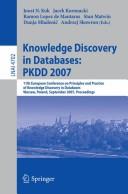
ISBN: 9783540749752 3540749756 3540749764 Year: 2007 Publisher: Berlin ; New York : Springer,
Abstract | Keywords | Export | Availability | Bookmark
 Loading...
Loading...Choose an application
- Reference Manager
- EndNote
- RefWorks (Direct export to RefWorks)
The two premier annual European conferences in the areas of machine learning and data mining have been collocated ever since the ?rst joint conference in Freiburg, 2001. The European Conference on Machine Learning (ECML) traces its origins to 1986, when the ?rst European Working Session on Learning was held in Orsay, France. The European Conference on Principles and Practice of KnowledgeDiscoveryinDatabases(PKDD) was?rstheldin1997inTrondheim, Norway. Over the years, the ECML/PKDD series has evolved into one of the largest and most selective international conferences in machine learning and data mining. In 2007, the seventh collocated ECML/PKDD took place during September 17–21 on the centralcampus of WarsawUniversityand in the nearby Staszic Palace of the Polish Academy of Sciences. The conference for the third time used a hierarchical reviewing process. We nominated 30 Area Chairs, each of them responsible for one sub-?eld or several closely related research topics. Suitable areas were selected on the basis of the submission statistics for ECML/PKDD 2006 and for last year’s International Conference on Machine Learning (ICML 2006) to ensure a proper load balance amongtheAreaChairs.AjointProgramCommittee(PC)wasnominatedforthe two conferences, consisting of some 300 renowned researchers, mostly proposed by the Area Chairs. This joint PC, the largest of the series to date, allowed us to exploit synergies and deal competently with topic overlaps between ECML and PKDD. ECML/PKDD 2007 received 592 abstract submissions. As in previous years, toassistthereviewersandtheAreaChairsintheir?nalrecommendationauthors had the opportunity to communicate their feedback after the reviewing phase.
Data mining --- Database searching --- Exploration de données (Informatique) --- Bases de données --- Congresses. --- Congrès --- Interrogation --- Computer Science --- Mechanical Engineering - General --- Engineering & Applied Sciences --- Mechanical Engineering --- 681.3*I2 <063> --- 681.3*H2 <063> --- 681.3*J1 --- 681.3*J2 <063> --- 681.3*H3 <063> --- 681.3*G3 <063> --- 681.3*I7 <063> --- 681.3*F42 <063> --- 681.3*F41 <063> --- Artificial intelligence. AI--Congressen --- Database management: security; integrity; protection--See also {?681.5*E5}--Congressen --- Administrative data processing (Computer applications) --- Physical sciences and engineering (Computer applications)--Congressen --- Information storage and retrieval--Congressen --- Probability and statistics: probabilistic algorithms (including Monte Carlo);random number generation; statistical computing; statistical software (Mathematics of computing)--Congressen --- Text processing (Computing methodologies)--See also {681.3*H4}--Congressen --- Grammars and other rewriting systems: decision problems; grammar types; parallel rewriting systems; parsing; thue systems (Mathematical logic and formal languages)--See also {681.3*D31}--Congressen --- Mathematical logic: computability theory; computational logic; lambda calculus; logic programming; mechanical theorem proving; model theory; proof theory;recursive function theory--See also {681.3*F11}; {681.3*I22}; {681.3*I23}--Congressen --- Information Technology --- Artificial Intelligence --- 681.3*J2 <063> Physical sciences and engineering (Computer applications)--Congressen --- 681.3*J1 Administrative data processing (Computer applications) --- 681.3*I2 <063> Artificial intelligence. AI--Congressen --- Computer science. --- Data structures (Computer science). --- Mathematical statistics. --- Database management. --- Information storage and retrieval. --- Artificial intelligence. --- Text processing (Computer science). --- Computer Science. --- Data Structures, Cryptology and Information Theory. --- Artificial Intelligence (incl. Robotics). --- Database Management. --- Information Storage and Retrieval. --- Probability and Statistics in Computer Science. --- Document Preparation and Text Processing. --- Processing, Text (Computer science) --- Database management --- Electronic data processing --- Information storage and retrieval systems --- Word processing --- AI (Artificial intelligence) --- Artificial thinking --- Electronic brains --- Intellectronics --- Intelligence, Artificial --- Intelligent machines --- Machine intelligence --- Thinking, Artificial --- Bionics --- Cognitive science --- Digital computer simulation --- Logic machines --- Machine theory --- Self-organizing systems --- Simulation methods --- Fifth generation computers --- Neural computers --- Data base management --- Data services (Database management) --- Database management services --- DBMS (Computer science) --- Generalized data management systems --- Services, Database management --- Systems, Database management --- Systems, Generalized database management --- Mathematics --- Statistical inference --- Statistics, Mathematical --- Statistics --- Probabilities --- Sampling (Statistics) --- Information structures (Computer science) --- Structures, Data (Computer science) --- Structures, Information (Computer science) --- File organization (Computer science) --- Abstract data types (Computer science) --- Informatics --- Science --- Statistical methods --- Data structures (Computer scienc. --- Information storage and retrieva. --- Natural language processing (Computer science). --- Data Structures and Information Theory. --- Artificial Intelligence. --- Natural Language Processing (NLP). --- NLP (Computer science) --- Artificial intelligence --- Human-computer interaction --- Semantic computing --- Information storage and retrieval systems.
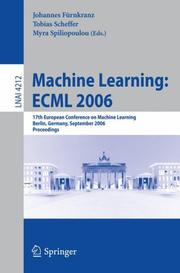
ISBN: 9783540453758 354045375X 354046056X Year: 2006 Publisher: Berlin ; New York : Springer,
Abstract | Keywords | Export | Availability | Bookmark
 Loading...
Loading...Choose an application
- Reference Manager
- EndNote
- RefWorks (Direct export to RefWorks)
Machine learning --- Apprentissage automatique --- Congresses. --- Congrès --- Computer Science --- Mechanical Engineering - General --- Mechanical Engineering --- Engineering & Applied Sciences --- 681.3*I26 <063> --- 681.3*I2 --- 681.3*F22 --- 681.3*F41 --- 681.3*H28 --- Learning: analogies; concept learning; induction; knowledge acquisition; language acquisition; parameter learning (Artificial intelligence)--See also {681.3*K32}--Congressen --- Artificial intelligence. AI --- Nonnumerical algorithms and problems: complexity of proof procedures; computations on discrete structures; geometrical problems and computations; pattern matching --See also {?681.3*E2-5}; {681.3*G2}; {?681.3*H2-3} --- Mathematical logic: computability theory; computational logic; lambda calculus; logic programming; mechanical theorem proving; model theory; proof theory;recursive function theory--See also {681.3*F11}; {681.3*I22}; {681.3*I23} --- Database applications --- Conferences - Meetings --- 681.3*I2 <063> --- 681.3*H2 <063> --- 681.3*J2 <063> --- 681.3*H3 <063> --- 681.3*G3 <063> --- 681.3*I7 <063> --- 681.3*F42 <063> --- Artificial intelligence. AI--Congressen --- Database management: security; integrity; protection--See also {?681.5*E5}--Congressen --- Physical sciences and engineering (Computer applications)--Congressen --- Information storage and retrieval--Congressen --- Probability and statistics: probabilistic algorithms (including Monte Carlo);random number generation; statistical computing; statistical software (Mathematics of computing)--Congressen --- Text processing (Computing methodologies)--See also {681.3*H4}--Congressen --- Grammars and other rewriting systems: decision problems; grammar types; parallel rewriting systems; parsing; thue systems (Mathematical logic and formal languages)--See also {681.3*D31}--Congressen --- Information Technology --- Artificial Intelligence --- 681.3*H28 Database applications --- 681.3*F41 Mathematical logic: computability theory; computational logic; lambda calculus; logic programming; mechanical theorem proving; model theory; proof theory;recursive function theory--See also {681.3*F11}; {681.3*I22}; {681.3*I23} --- 681.3*F22 Nonnumerical algorithms and problems: complexity of proof procedures; computations on discrete structures; geometrical problems and computations; pattern matching --See also {?681.3*E2-5}; {681.3*G2}; {?681.3*H2-3} --- 681.3*I2 Artificial intelligence. AI --- 681.3*I26 <063> Learning: analogies; concept learning; induction; knowledge acquisition; language acquisition; parameter learning (Artificial intelligence)--See also {681.3*K32}--Congressen --- 681.3*J2 <063> Physical sciences and engineering (Computer applications)--Congressen --- 681.3*I2 <063> Artificial intelligence. AI--Congressen --- Computer science. --- Algorithms. --- Mathematical logic. --- Database management. --- Artificial intelligence. --- Computer Science. --- Artificial Intelligence (incl. Robotics). --- Algorithm Analysis and Problem Complexity. --- Mathematical Logic and Formal Languages. --- Database Management. --- AI (Artificial intelligence) --- Artificial thinking --- Electronic brains --- Intellectronics --- Intelligence, Artificial --- Intelligent machines --- Machine intelligence --- Thinking, Artificial --- Bionics --- Cognitive science --- Digital computer simulation --- Electronic data processing --- Logic machines --- Machine theory --- Self-organizing systems --- Simulation methods --- Fifth generation computers --- Neural computers --- Informatics --- Science --- Data base management --- Data services (Database management) --- Database management services --- DBMS (Computer science) --- Generalized data management systems --- Services, Database management --- Systems, Database management --- Systems, Generalized database management --- Algebra of logic --- Logic, Universal --- Mathematical logic --- Symbolic and mathematical logic --- Symbolic logic --- Mathematics --- Algebra, Abstract --- Metamathematics --- Set theory --- Syllogism --- Algorism --- Algebra --- Arithmetic --- Foundations --- Computer software. --- Artificial Intelligence. --- Software, Computer --- Computer systems
| Listing 1 - 8 of 8 |
Sort by
|

 Search
Search Feedback
Feedback About UniCat
About UniCat  Help
Help News
News